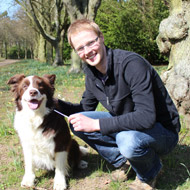
Identifies genetic mutation responsible for sensory neuropathy
Scientists at the Kennel Club Genetics Centre at the Animal Health Trust (AHT) have identified the genetic mutation responsible for sensory neuropathy (SN).
A DNA test will be available to order from the AHT DNA Testing Service from Monday, 27 April.
A border collie combination test, testing for SN, trapped neutrophil syndrome and Vitamin B12 deficiency, will also be available to order.
Dr Oliver Forman, Genetics Researcher at the AHT and lead of the SN investigation, said: “It’s really important for the border collie population that we’ve been able to identify the genetic mutation responsible for this debilitating disease and develop a DNA test so quickly.
“Although this is a relatively rare condition, DNA testing offers the chance of eliminating this disease from the breed, and will avoid the risk of it becoming a bigger problem in the future. As the condition is rare it’s impossible to predict which lines contain carriers so DNA testing is the only way to ensure carrier to carrier matings are avoided, which could result in litters containing affected puppies.”
SN is a severe, untreatable, neurological disease which affects young border collies. Dogs affected by the disease gradually lose sensation in their limbs due to the degeneration of sensory and motor nerve cells and have to be euthanised.
The onset of the disease is usually between two and seven months of age and clinical signs include knuckling of the feet, self-mutilation wounds and a progressive lack of coordination.
Caroline Kisko, Kennel Club secretary, said: “We are delighted that the Kennel Club Genetics Centre at the Animal Health Trust has made this breakthrough, which will undoubtedly improve the health of border collies by enabling breeders to help eradicate this nasty condition from their breed.
“Scientists at the Kennel Club Genetics Centre at the AHT are making great strides in their work, which goes a long way in improving dog health across the board and we would encourage Border Collie breeders to utilise the new DNA test to help cement the next stage in their breed’s health – eradicating this horrible disease.”
For more information about SN, or to order the test, visit: www.aht.org.uk/caninegeneticssuccess.
Image (C) The Kennel Club Genetics Centre



 The RCVS has announced a new version of its 1CPD mobile app, with enhanced features for veterinary surgeons and veterinary nurses to record their continuing professional development.
The RCVS has announced a new version of its 1CPD mobile app, with enhanced features for veterinary surgeons and veterinary nurses to record their continuing professional development.